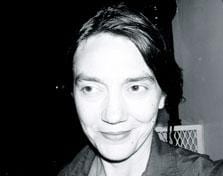It’s easy to spot Sina Queyras in a crowd. She’s the one standing on the fringes of the group, fiddling with her camera or writing in a notebook. “I am usually immediately marked as ‘outsider,’” she says — an observation that feeds into her poetry.
“If my experience in the world proves anything,” she adds, “it’s that what is lesbian about me and my texts, even when there are few visible markers, seems to radiate very loudly.”
Her latest collection of poems, Expressway, takes that sense of alienation on the road. It’s inspired by the irony of modern mobility — the more highways we build, the less we feel connected to each other and the natural environment. Worse still, as these ribbons of concrete carve up our communities and green spaces, nobody speaks out. Queyras echoes the pastoral elegies of the Romantic poets to challenge that tacit acceptance. Her expressway is “a patch/ Of emerald turf besieged by doggy bags,” where one can “Wander, lonely as a cloud, dappled, drowned,/ A melancholic pace and nowhere untouched.”
It’s no coincidence that Queyras wrote most of the poems while living in Calgary, the oil capital of Canada. Although the city’s lack of tolerance was galling — “people talked about how difficult it was to write when they were still in the closet and could see no way to come out” — she was most shocked by the one person, one car culture. “It made me incredibly sad,” she says.
Queyras is no stranger to the ways of western Canada. Her father was a road builder in BC and Alberta and Queyras attended 22 schools there. That feeling of displacement is clearly a strong influence.
Queyras’s sexuality also figures prominently in her work, although it’s not always explicit. Her third collection of poetry, the Lambda award-winning Lemon Hound, is a response to the work of Virginia Woolf. The lesbian subtext in Expressway is less obvious.
“There’s a lot of pussy in this book. Even when it seems to be about something else, just think pussy,” says Queyras with a laugh. “No, I’m kidding. But the lesbian angle is throughout since it’s my perspective as a lesbian that allows me to see the world the way I do. Is my narrator, the one who shows up in the Memorable Fancy sections, a lesbian? I would say so.”
Now living in Montreal, Queyras is at work on her first novel, Autobiography of Childhood, and writes a regular blog, Lemonhound.blogspot.com.
As ever Queyras is happy to be constantly in motion. She even writes on the move, jotting down a few lines when she’s on the train or in the subway.
“It’s about catching a wave when I can,” she says. “In short, I remain alert. As Tom Waits says, songs are in the air, you just need to reach out and grab them.”

 Why you can trust Xtra
Why you can trust Xtra


